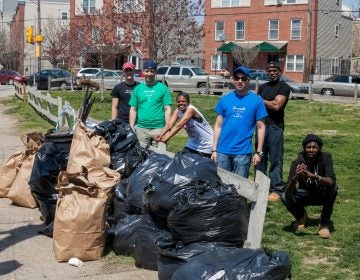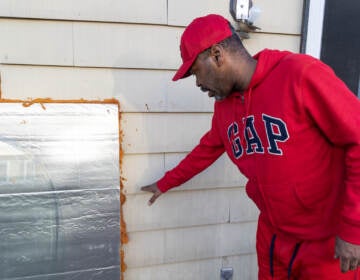Philly sanitation workers blame filthy streets on ‘poor management’; apologize for rotting trash
Philadelphia sanitation workers say Mayor Jim Kenney’s management is to blame for the mounds of stinky trash proliferating across the city.
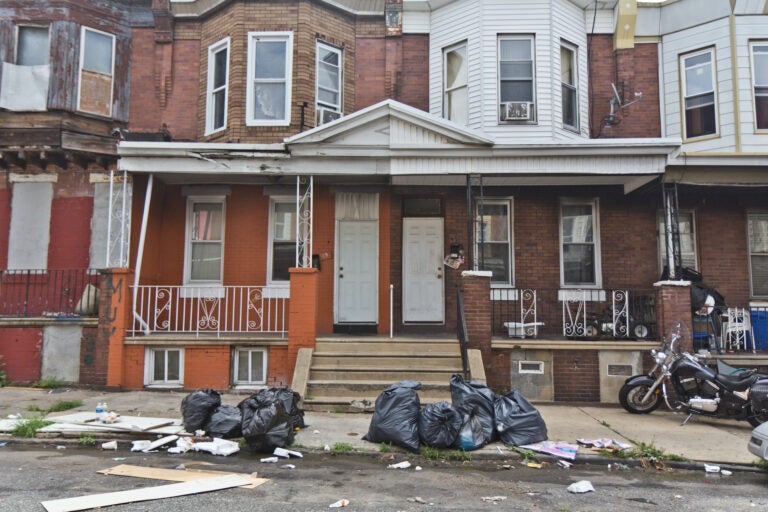
Some city residents say they are fed up with delayed trash collection. (Kimberly Paynter/WHYY)
Roberto Diaz, a 65-year-old Vietnam veteran, has lived on the corner of Water and Ontario streets in Fairhill for 15 years.
He regularly sweeps up litter on his block but said that never before has the windswept bags, wrappers and debris accumulated quite like the mess of recent days.
“Look at all this! Look at all this street!” Diaz said, pointing at piles of trash bags on the sidewalks. “And everyone is acting as if it’s OK. It’s not OK!”
“This place looks like dirt, man,” he added. “How much longer are we going to have to put up with this?”
Trash and recycling have been piling up all across the city as a result of delays announced by city officials on Monday. Flies and maggots have been doing what they do right in front of people’s homes, filling city streets and alleys with a rotting smell and threatening the health of kids playing around the towers of trash. Dogs and cats have taken advantage of the situation, biting the bags and tearing the plastic, sending rubbish across sidewalks and streets. And with the help of a breeze, even the most earthly piece of waste can fly, spreading the filth further.
Philadelphia gets an abundance of complaints regarding trash, but rubbish and recycling 311 complaints this week are up to 10 times higher — from a daily average of about 110 before April to over 1,090 on July 13.
My neighbor’s trash not picked up at the corner of Forrest and Upsal, despite the fact that we were promised that the trash trucks would return. It is now 3 days late. This is unacceptable. We pay taxes @PhilaStreets. Come pick up the trash.
— Solomon Jones (@solomonjones1) July 16, 2020
The city’s Streets Department asked residents for patience and apologized for the inconvenience, arguing their service has been hampered by an increase of trash put out by residents during the pandemic and the Fourth of July weekend, as well as torrential rains in recent weeks.
“Our people have been staying home now for five months. And I know in my own living situation, we’ve been producing a lot more trash and garbage than we would have if we were going to work every day,” Mayor Jim Kenney said Thursday.
Kenney said crews have been working non-stop, throughout the weekend, to catch up, but these are extremely difficult times, he said.
“It’s been a little hot, too, by the way, if anybody’s not noticed that. It’s been hot and this is a historic pandemic and practical financial depression. I mean, I think our workers are doing a pretty goddamned good job frankly,” Kenney said.
On Thursday, Philadelphia’s outgoing Managing Director Brian Abernathy said that the Streets Department had begun “shifting crews from collecting one material — trash or recycling — to the other, to make sure that we catch up.”
But Omar Salaam, a business agent with AFSCME District Council 33, which represents more than 1,100 Streets Department workers, said the pandemic and the heavy rains are just an excuse the city is using to explain the delays.
“Weather is not the problem, it’s poor management,” he said.
Salaam said that this week, sanitation trucks are collecting both trash and recycling, a change that the union opposes because it creates more work per shift and prevents the contents of blue bins from being recycled.
“You’ve got a whole bunch of recycling programs going on, and mixing trash and recycling just isn’t a good idea,” Salaam said.
The Streets Department confirmed that workers were emptying trash cans and recycling bins in the same trucks.
“Materials are going into the same truck because due to the heavy rains last week, a lot of the materials sitting out are wet and contaminated. Recycling materials will be unable to be processed as recycling,” Streets Department spokesperson Keisha McCarty-Skelton said in an email.
Salaam said the weather was only part of the explanation.
“We had rain for maybe about two or three days,” he said. “Rain only contaminates cardboard. It doesn’t contain the glass, it doesn’t contaminate aluminum and it doesn’t contaminate plastic.”
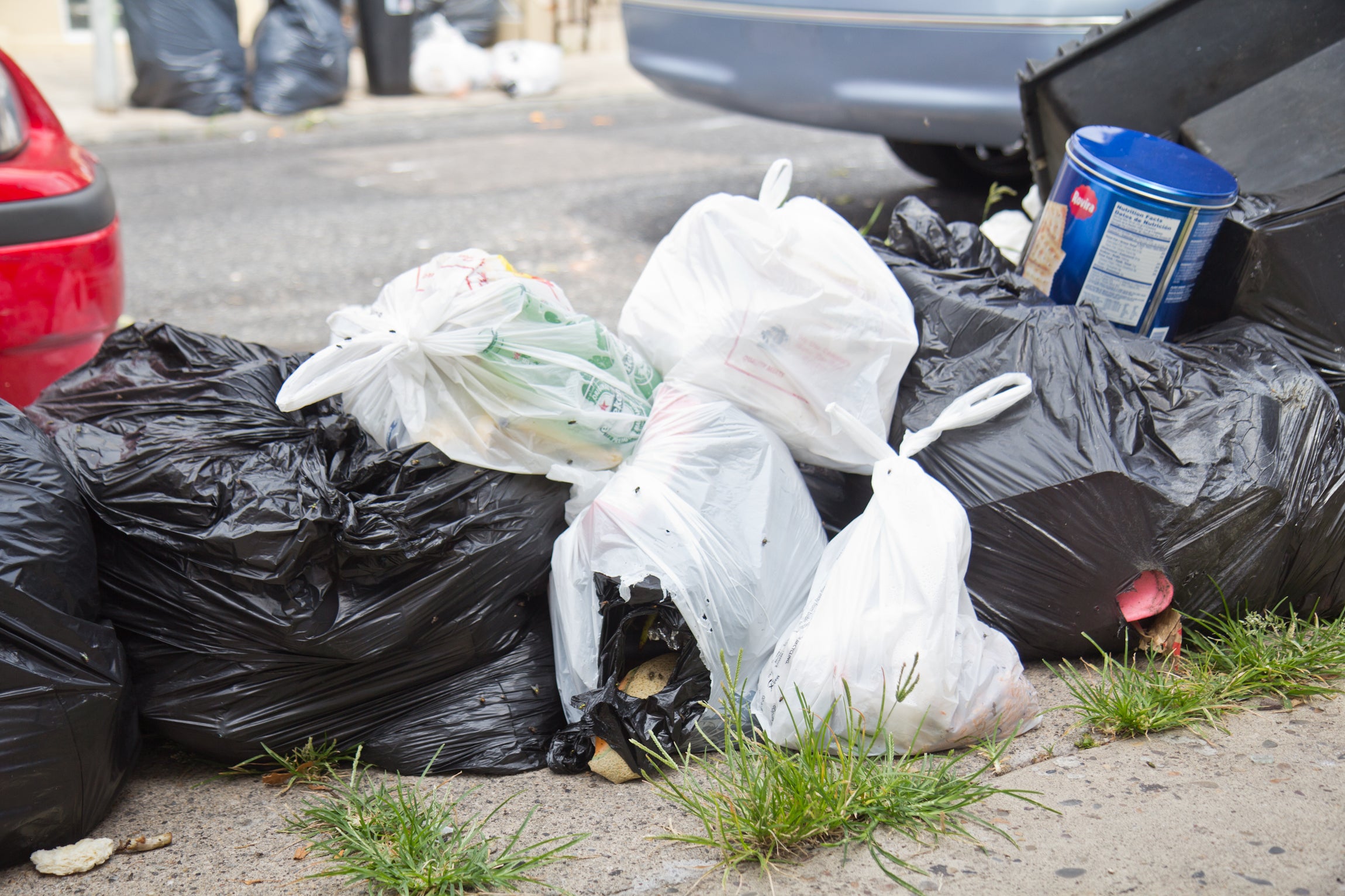
25% more trash, same number of cleaning crews
The pandemic has increased the amount of trash generated by city residents at home by at least 25% in tonnage each week, McCarty-Skelton said.
The mounting piles of garbage bags add up to three tons more waste headed to landfills each week, she said.
McCarty-Skelton said the tonnage increase — from 11 tons weekly on average in 2019 to 14 tons weekly as of late — represents an additional cost of approximately $2.2 million in collection and tipping fees. That includes deploying more trucks and staff when possible.
Salaam said the only way to deploy more trucks is to hire more workers — or increase pay to incentivize existing workers to take on extra shifts.
Sanitation workers are tired, he said. They’ve been working hard for 16 or 17 days straight, for 12 to 14 hours, without taking a day off, with no hazard pay, and sometimes without being paid for overtime.
“I want to start by apologizing to the public because we understand,” Salaam said. “We live in the city of Philadelphia. So when a resident’s trash is outside, our trash is put in front of our doors.”
While city officials had blamed delays on workforce shortages due to exhaustion, injuries and health or family issues linked to COVID-19, Salaam said the problems were brewing well before the pandemic and the union warned city officials. Yet no action was taken.
He said people keep getting sick because they have not yet received adequate personal protective equipment from the city, and have so far been relying on donations to buy N95 masks.
According to Salaam, there are about 30 sanitation workers who have either tested positive or are waiting for test results in the Northeast district right now.
Sanitation workers have told the administration about the need for better protective equipment even before COVID-19. But those needs were never taken into consideration, he said.
“Really the problem that we’re dealing with right now is a lack of leadership and a lack of people who actually know what they’re doing,” Salaam said. “A lot of the trash being left in the ground is a result of poor management decisions and, unfortunately, people getting sick. That’s what’s happening.”
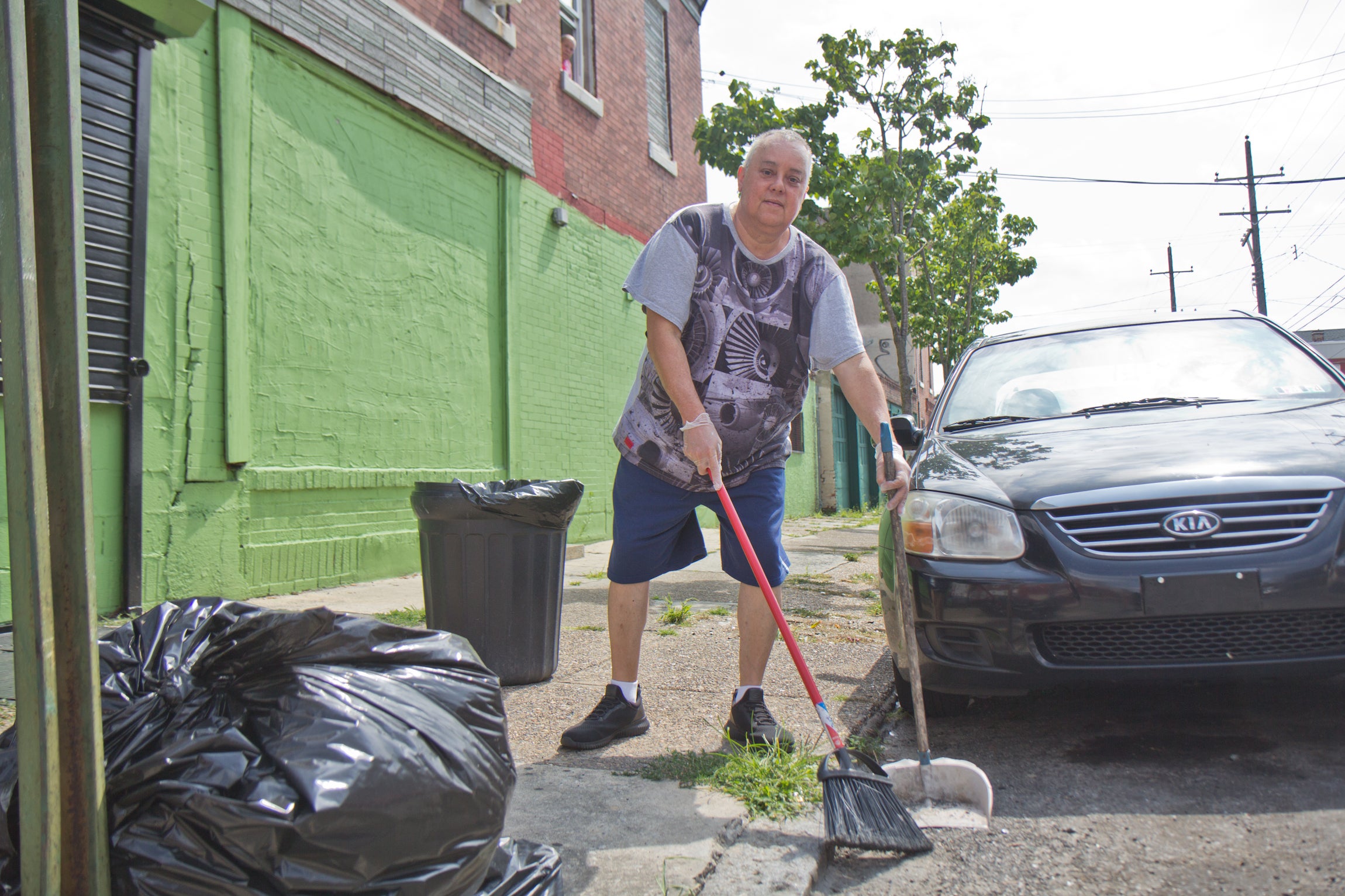
Meanwhile, Roberto Diaz keeps sweeping his block. But he’s getting tired.
“The place is starting to smell now, you know what I’m saying. We’re starting to get roaches and all,” he said on Thursday morning. “What’s going on? I don’t understand. And I don’t know why we should be having to pay for this. Because we pay our taxes.”
“It stinks,” said Angel Cruz, a 37-year-old resident who lives a couple of blocks from Diaz.
Cruz admits his family is producing more trash now that the kids are not at school and adults are not out working.
“We got lots, eight bags, nine bags. We usually have four or five,” he said. “And the recycle, there’s a whole bunch of recycling ’cause we drink water, water bottles, cans, so it’s like, it just keeps accumulating.”
The city is asking residents to just leave their trash and recycling outside until the trucks do arrive.
“While we truly understand the unsightly look and smell that results when having trash and recycling remain, we do not want residents to bring materials back in as this will only create double materials left for pick up the following week which could result in further delays,” said Streets Department’s McCarty-Skelton.
I put my trash out Thursday night and it’s still sitting there. When will the City of Philadelphia pick it up?
— Kevin Kinkead (@Kevin_Kinkead) July 12, 2020
But Cruz said his trash and recycling has been out for too long now, and he’s getting impatient.
“It’s rotting,” he said. “The whole block stinks like, you know, cat droppings and animals.”
WHYY is your source for fact-based, in-depth journalism and information. As a nonprofit organization, we rely on financial support from readers like you. Please give today.



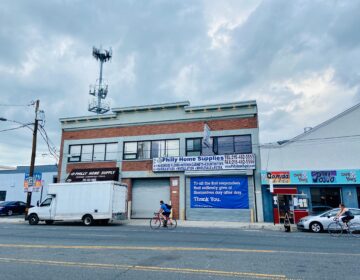

![CoronavirusPandemic_1024x512[1]](https://whyy.org/wp-content/uploads/2020/03/CoronavirusPandemic_1024x5121-300x150.jpg)
